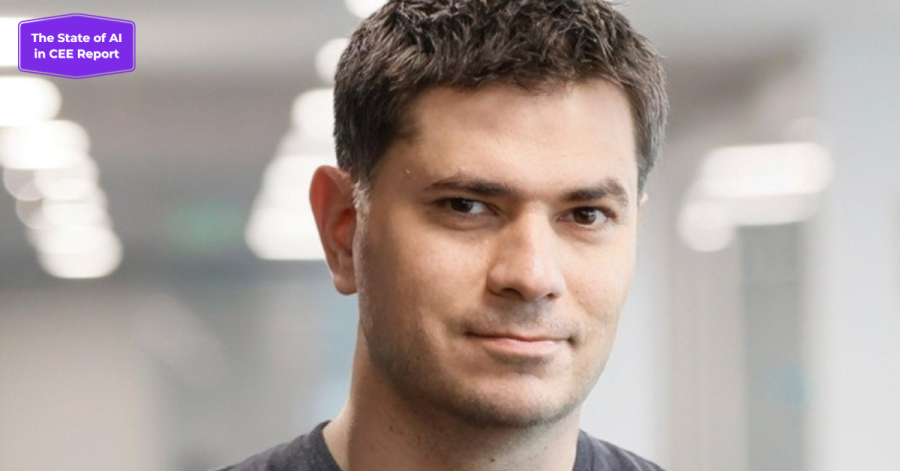“AI has this type of disproportionate impact, where numbers don’t matter anymore, in a sense. I believe this can be a fantastic driver for growth in the region,” Ioan Iacob, the founder of FLOWX.AI, tells me.
FLOWX.AI is a revolutionary enterprise AI application modernization platform that fundamentally changes how large enterprises build core digital products and modernize applications systems and infrastructure. In May 2023, FLOWX.AI raised the largest Series A globally in the industry in recent years to modernize large enterprises and bring AI to the enterprise world at scale. It is one of the top funded AI companies in Romania, according to The Recursive AI report.
Before his current role, Ioan Iacob founded, grew for more than 15 years, and successfully exited QUALITANCE, a pioneering consulting company focused on enterprise digital transformation programs for large global brands like IKEA, Merck, Ford or NewsCorp.
The following interview was conducted as a part of The Recursive’s “State of AI in CEE” report. Download the full report with insights from 40+experts and analysis of 900 AI product companies from CEE here.
The Recursive: What are the main pain points and challenges that FLOWX.AI aims to address?
Ioan Iacob: IT teams are currently suffocating under layers of technologies, solutions, and proprietary languages. In this landscape, we took a step back and asked: how can we help companies dig their way out of that predicament?
Our solution comes on the back of more than 10 years of working on digital transformation projects with global enterprises. We created a platform that is completely different from anything else on the market, which is seen in the results of our customers today: they can build in weeks what used to take them years. It offers a totally different level of efficiency in building enterprise software. We give back control to the enterprises over technology and their businesses. And we give them an incredible competitive advantage, by being able to respond to the market and to transform in real time.
What is the role of AI in the solution you offer, as well as in the enterprise sector, which you address?
Our goal, from the very beginning, was to leverage AI and make the best platform for enterprises to build modern digital solutions, both customer and internal-facing. Today we’re using AI to essentially understand enterprise business and translate that into digital solutions. To make integrations with other systems, including legacy systems, an order of magnitude faster than anything else on the market. We can provide machine learning-powered insights for our clients to optimize their business. Ultimately, this kind of disproportionate impact of AI is why the teams using the FLOWX.AI platform are orders of magnitude faster, and why organizations can drive massive ROI.
So when talking about the supportive ecosystem you had around building the product from Romania, would you mention any particular opportunities that helped you?
I think it’s very interesting that a lot of talent developing engineering products and AI around the world comes from the region. I think this shows a strong pragmatic drive for things that are substantive and for creating value. So there’s this extremely deep talent pool in Eastern Europe for building great engineering products. Romania is kind of one of the leaders and we certainly have one of the biggest success stories – UiPath. Also, if you look also at companies like DeepMind, many of their employees are from this region. So, for that reason, at FLOWX.AI, we will continue to have our main development team here for the foreseeable future. Of course, especially now after our Series A we have access to the best talent across the world, and we are augmenting our engineering team with the best people,
In terms of support from the ecosystem, what would we need more of to unlock the next level of growth?
One of the things we really appreciate is that the government has been smart enough to not create friction for companies operating here. Of course, like with any government, there’s always room for improvement. We’d love to see more thoughtfulness on how to reduce friction and on efficient and smart regulation. We already have a great internet and great infrastructure from that point of view. I think that is actually incredibly useful and has contributed a lot to the accessibility of Romania as a talent pool.
And I believe there is a massive opportunity for Eastern Europe and Romania, in particular, to drive this emphasis in the education system around edge technologies – and AI is definitely one of them.
How do you see the level of collaboration between academia, the scientific community, and the public sector, at the moment, and going forward?
I believe it’s been improving a lot, and I think there’s been a lot of advancement in de-siloing academia, the private sector, and the public sector. Especially in Romania, we’ve seen a lot of joint initiatives between academia and private companies. The more pragmatic and results-driven we can make our academic programs, the better for the students and the ecosystem, as well.
How was the process of raising a Series A? What were the challenges for you?
We announced the opening of the round and one week later, we had six term sheets and some of the best VCs in the world. And I think that’s because we’re really focused on solving a huge problem unsolved in the industry for a long time, and because we’ve been consistently demonstrating or enabling our clients to demonstrate results. I think what resonated a lot with our investors – is the opportunity to completely change how enterprise software is being developed for the next 50 years. It’s not like a kind of next-couple-of-years type of opportunity; it’s transformational for the entire industry.
What’s your stance on AI regulation?
I believe in smart regulation. I think the one thing we need today is efficient, smart regulation in the AI area. It’s an iterative process and we’re going to get there. I am not super happy about the current status, but I believe that these are kind of natural iterations that just need to happen.
What’s next for FLOWX.AI?
The very first step is to bring a very stable and mature platform to customers in the US and to more customers in Europe. We believe a lot in the transformational power of AI in the enterprise sector. Our belief is that AI will completely reshape the enterprise sector. And that was also the belief of our investors. So we believe that AI is what is going to allow enterprises to pick themselves up out of this complexity that they find themselves in and it will allow people to develop digital products faster and cheaper, and, by the way, take advantage of their legacy systems in a completely new way. Ultimately, this will translate into benefits for employees and customers.








